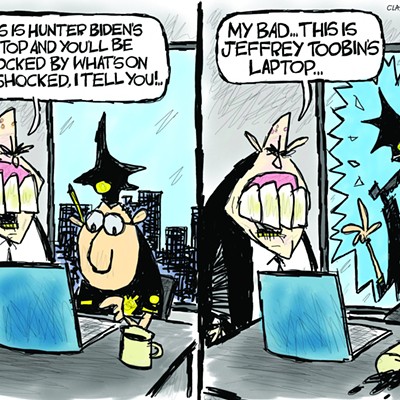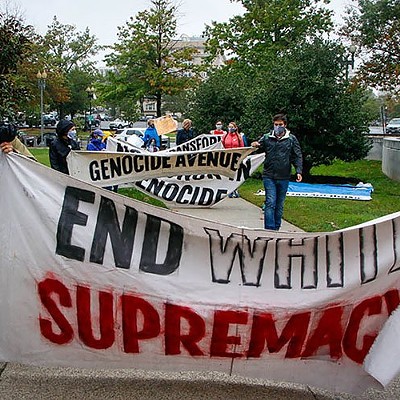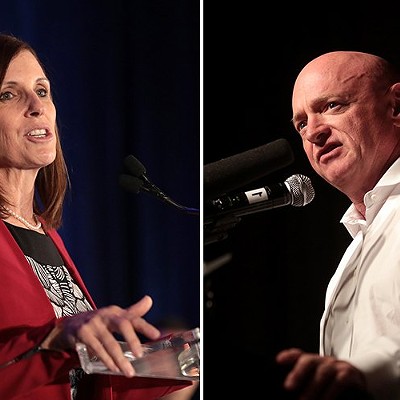Where the Constitution and New Testament go hand in hand in interpretation and verse.
And while it might not have quite the old flair, the Saturday Morning Breakfast Club still gets back to basics every week at the eastside Mimi's Café.
Anti-tax, anti-immigration, anti-social programs.
The regular stuff.
In the old days, this dream of Richard Huff, a real-estate man who got clobbered in a Republican try to unseat beloved Democratic Congressman Morris K. Udall 21 years ago, was a more rollicking weekly affair opened by piano and song--usually "It's a Grand Old Flag."
It was after that cheery number, pounded out by somebody's auntie, back in 1986 during the Sanctuary trial that Rev. Fife, the humble and straight-shooting southside Presbyterian, looked a little surprised to see that the fellow he was sharing the podium with was a leader of Southern Arizona's self-styled Posse Comitatus. Posse members played soldier on the border that Sanctuary workers slipped past to deliver Central American refugees to el norte.
Huff patterned the Saturday Morning Breakfast Club after one in Phoenix and it attracted, for a time, attention. It could reel in speakers. Local politicians had to keep it on the calendar, if only when they were summoned to the "hot seat." U.S. Rep Jim Kolbe, the Tucson Republican who also vanquished Huff along with Conrad Joyner in the 1982 GOP primary, accepted numerous Breakfast Club invitations when bread, pancakes and eggs were broken at the former Plaza International at Speedway and Campbell.
Carl Tretschok, a businessman and property investor, could be counted upon to rise with U.S. Constitution in hand to quiz guests or to rail. Tretschok was a familiar figure in another arena, monitoring and policing and speaking out to the City Council on Tucson Water.
This was the type of club and forum where Evan Mecham, the Ajo-then-Glendale Pontiac dealer who deployed two masterful campaigns in 1986 to become governor, could get a lot of love. When much of the state was ripping Mecham for repealing Bruce Babbitt's poorly done King holiday and for a variety of other miscues like misspending money, he had haven in Tucson at the Saturday Morning Breakfast Club.
For some, even Mechamites, the Breakfast Club was hijacked by conservatives and constitutionalists too right for The Right.
Byron Howard, a former Pima County sewer director, former homebuilder and unsuccessful candidate for the Board of Supervisors last year, has made Breakfast Club appearances. Howard, who has earned high marks for his work as top aide to Democratic Councilwoman Shirley Scott, says the club has its place.
"It's part of Tucson's color," Howard says.
That would be white.
BREAKFAST OVER AND back in the real community, some ethnic balances may be shifting. Some need to shift.
Of the 64,000 students in the sprawling Tucson Unified School District, roughly 55 percent are Mexican-American even though TUSD, addicted to special taxes, can't manage to desegregate.
Its Governing Board has only one Mexican-American, Rosalie Lopez, a Republican, and the leadership is white. Mexican-Americans and other minorities allowed a free, white ride to Joel Ireland, Mary Belle McCorkle and Judy Burns for the three TUSD seats up last year. TUSD does have its second straight Mexican-American superintendent, though, Stan Paz.
In the Board of Supervisors' contentious redistricting, two districts--2 on the south side and 5 on the west side and in Sam Hughes--gained Mexican-American population. District 2, represented for 13 and a half years by Democrat Dan Eckstrom, became the first minority-majority district since the board expanded to five.
The plan also wiped out a southwest-side bloc of Mexican-American and Native-American voters from District 3, represented by Democrat Sharon Bronson. That move will diminish the ability of a Mexican-Americans to win in a Democratic primary, although the under-funded and absent (due to family illness) Richard Pacheco came close last year.
Chicano activist Salomon Baldenegro, who now writes a regular column in Gannett's Tucson Citizen, was on the redistricting committee and gave a defensive discourse on the plan--criticized for its Democrat-only preparation--and ridiculed Republicans, saying they could hardly complain and that they were hardly the party of Mexican-Americans.
Republican Supervisor Raymond Carroll, a Chicago Irish kid, took exception, noting that his wife's family is Hispanic and Republican.
But they are the rare finds in the nearly-all-white Tucson Country Club Estates, also home to Republican Party Chairman John Munger, a Tucson attorney who is to be credited with lighting a fire under Republicans to nail two seats on the City Council in last month's election.
Munger has got a problem.
As a pillar under Republican Mayor Bob Walkup, he is pushing for metro-area annexation. Will he start with his home in the Tucson Country Club Estates? (It is worth noting that its streets are public, and as then-City Attorney Fred Dean said in 1990, not even a moat could stop the public from Tucson Country Club Estates.)
Munger's neighborhood has fiercely fought annexation. The last go-round was in 1990, when backers of their precious country club led the resistance.
And as the county GOP boss, Munger is being told--by heavies Jim Click, also a Tucson Country Club resident, and Bob McMahon--to add color to the party. Specifically, they told him at a gathering at McMahon's Prime Steak House, to brown it up.












